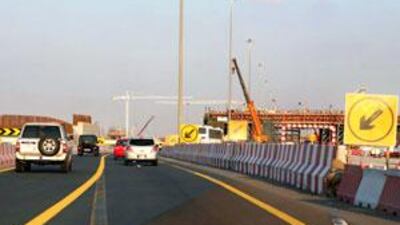Abu Dhabi's transport authority may revise its schedule to spend an estimated Dh300 billion (US$81.68bn) on building major roads, bridges and rail projects over the next 20 years as it awaits the latest word on the emirate's population. Abdullah al Otaiba, the chairman of the Department of Transport (DoT), said he was awaiting the findings of a study from the Urban Planning Council on population growth in the emirate.
Under its 2030 plan, which was written in 2007 before the global downturn, Abu Dhabi had forecast its population of 930,000 metropolitan residents would swell to 1.3 million by 2013 and 3.1 million by 2030. However, many conventional assumptions and economic forecasts have been upended in every region of the world as the worst economic crisis in more than 70 years has sapped credit, caused property and equity values to drop and eroded trillions of dollars in wealth.
"There is a study with the Urban Planning Council, and this revision will strongly affect the plans of the transport system in Abu Dhabi," Mr al Otaiba said. "The revisions are based on whether the population is growing more than anticipated or less than anticipated, and based on this, the schedule will be fast-tracked or delayed a little." Mr al Otaiba was responding to a question on the sidelines of the Gulf Logistics Forum yesterday in the capital about when the design consulting contract for the 130km Abu Dhabi metro would be awarded. The contract was expected to be awarded last year after the DoT reportedly narrowed the list of candidates in July.
The council is expected to conclude its population study in the next six months, Mr al Otaiba said. A spokesman for the council said: "UPC is working closely with the real estate and development community in Abu Dhabi and is currently developing a comprehensive study with an outlook on facilitating the planning and implementation phases of its stakeholders' projects up until 2013." The added focus on delivery schedules come as the Abu Dhabi Government also considers asking construction companies to take on more of a collaborative role in the financing of transport projects, called public-private partnerships.
Fully one third of the Government's estimated Dh300bn in metro, tram, high-speed rail, motorway and bridge projects outlined in the Government's 2030 plan could be financed under this method, DoT officials said last month. John Lee, the motorway and planning adviser for the DoT, said funding for transport projects coincided with those for new airports and port, power, water and sewerage facilities and nuclear reactors.
"If we can get the private sector to come up with capital, whether from equity or loans, to build elements of the plan, it is going to be very attractive for the Government because it results in a shifting in expenditures from the government purse to the future," Mr Lee said at a conference. "So PPPs [public-private partnerships] are going to be something we look at." A PPP is typically structured with a builder sharing the price of an infrastructure project by paying the upfront costs of construction.
The government client then pays for the project incrementally over the life of the assets, which can be between 25 and 30 years in the case of a motorway. This relieves the government of coming up with the entire capital costs of the project at the outset and gives the contractors an incentive to finish on time and on budget. @Email:igale@thenational.ae

